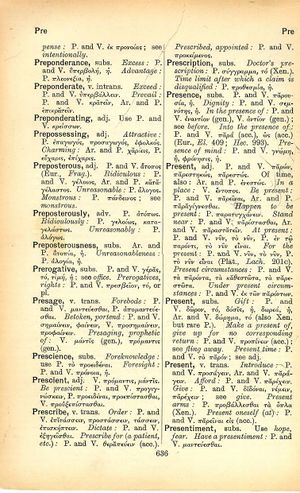present
τίς ἐς σὸν κρᾶτ' ἐπύκτευσεν → who hit you with the fist on the head, who has been pummeling your head
English > Greek (Woodhouse)
adj.
P. and V. παρών, παρεστηκώς, παρεστώς. Of time, also:Ar. and P. ἐνεστώς. In a place: V. ἔντοπος. Be present: P. and V. παρεῖναι, Ar. and P. παραγίγνεσθαι. Happen to be present: P. παρατυγχάνειν. Stand near: P. and V. παρίστασθαι, Ar. and V. παραστατεῖν. At present: P. and V. νῦν, τὸ νῦν, P. ἐν τῷ παρόντι, τὸ νῦν εἶναι. For the present: P. and V. νῦν, τὸ νῦν, P. τὸ νῦν εἶναι (Plat., Lach. 201C). Present circumstances: P. and V. τὰ παρόντα, τὰ καθεστῶτα, τὰ παρεστῶτα. Under present circumstances: P. and V. ἐκ τῶν παρόντων. subs. Gift: P. and V. δῶρον, τό, δόσις, ἡ, δωρεά, ἡ, Ar. and V. δώρημα, τό (also Xen. but rare P.). Make a present of, give up for no corresponding return: P. and V. προσπίνειν (acc.); see fling away. Present time: P. and V. τὸ παρόν; see adj. v. trans. Introduce: P. and V. προσάγειν, Ar. and V. παράγειν. Afford: P. and V. παρέχειν. Give: P. and V. διδόναι, νέμειν, παρέχειν; see give. Present arms: P. προβάλλεσθαι τὰ ὅπλα (Xen.). Present oneself (at): P. and V. παρεῖναι εἰς (acc.).

